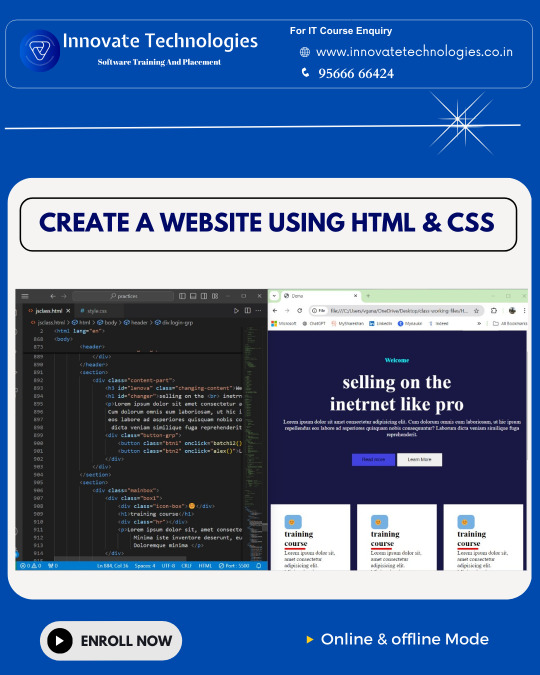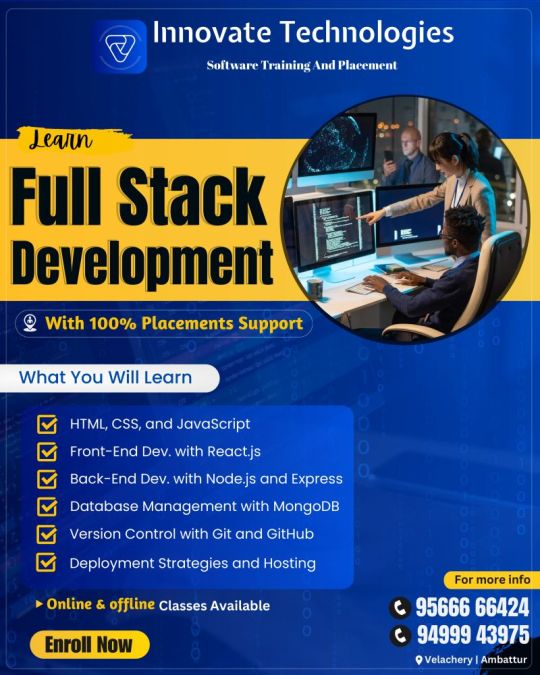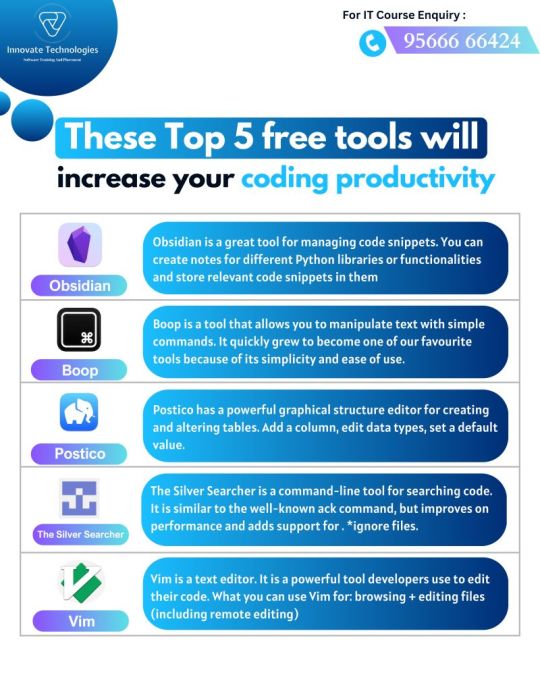#fullstackdevelopmentcourseinchennai
Explore tagged Tumblr posts
Text
Does full stack development have a future?
Yes, full stack development has a bright future in the tech industry, and its demand is expected to grow for several reasons. Here's a detailed exploration of why full stack development is and will continue to be a promising career path:
1. Increasing Demand for Versatile Developers
Companies are constantly seeking developers who can handle both front-end and back-end development to save costs and streamline collaboration.
Startups and small businesses, in particular, prefer hiring full stack developers who can take ownership of entire projects, from concept to deployment.
2. The Rise of Web and Mobile Applications
With businesses moving online and the demand for digital solutions skyrocketing, full stack developers are crucial for creating scalable and efficient web and mobile applications.
Technologies like React Native and Flutter allow full stack developers to work on cross-platform applications, enhancing their value in the market.
3. Agile Development Practices
Modern software development relies heavily on agile methodologies, which emphasize cross-functional teams.
Full stack developers, with their understanding of both ends of the stack, fit well into agile environments and contribute to faster development cycles.
4. Advancements in Technology
The emergence of new tools and frameworks (e.g., Next.js, Node.js, and MongoDB) continues to make full stack development more efficient and accessible.
Full stack engineers can quickly adapt to technological changes and leverage cutting-edge tools to deliver innovative solutions.
5. Growing Popularity of SaaS and Cloud-Based Applications
The software-as-a-service (SaaS) model is dominating the industry, and full stack developers play a vital role in building and maintaining these applications.
Skills in cloud technologies (AWS, Azure, Google Cloud) further enhance the relevance of full stack developers in building scalable systems.
6. Opportunities in Freelancing and Entrepreneurship
Full stack development skills are highly valued in the freelancing market, where clients look for developers who can deliver end-to-end solutions.
For aspiring entrepreneurs, full stack development provides the technical foundation to build and launch products independently.
7. Remote Work Compatibility
The COVID-19 pandemic and the rise of remote work have increased the demand for versatile developers who can work independently and handle multiple aspects of a project.
Full stack developers are well-suited for remote roles due to their broad skill set and ability to collaborate effectively across distributed teams.
8. Integration with Emerging Technologies
Full stack developers are increasingly involved in projects involving:
Artificial Intelligence (AI) and Machine Learning (ML): Integrating AI/ML capabilities into applications.
Internet of Things (IoT): Building full-stack solutions for connected devices.
Blockchain: Developing decentralized applications with both front-end interfaces and smart contract integration.
9. Continuous Learning Opportunities
Full stack development inherently involves learning a wide range of technologies, making it a dynamic and exciting career path.
Developers who enjoy solving diverse challenges and staying updated with the latest trends will find this field rewarding.
Challenges and How to Overcome Them
While full stack development has a promising future, it comes with challenges such as:
Staying Updated: Keeping up with rapidly evolving technologies can be overwhelming. Continuous learning and specialization in one area while maintaining broad knowledge are key.
Burnout Risk: Being responsible for the entire stack can be demanding. Effective time management and collaboration can mitigate this.
Conclusion
The future of full stack development is secure, with vast opportunities across industries and sectors. As businesses increasingly rely on digital solutions, the role of full stack developers will continue to grow in importance.
Whether you're just starting or looking to advance your career, investing in full stack development skills offers significant long-term benefits and a wealth of career options.
FULLSTACK COURSE IN CHENNAI
FULLSTACK DEVELOPER COURSE IN CHENNAI
FULLSTACK DEVELOPMENT COURSE IN CHENNAI
FULLSTACK TRAINING IN CHENNAI

The tech industry in 2025 is booming, and full stack developers in chennai are at the forefront of this digital transformation. Their versatility and ability to handle both frontend and backend development make them invaluable assets to businesses of all sizes. Let’s explore why full stack developers are in such high demand and the trends shaping their role.
The Growing Demand for Full Stack Developers
Full stack developers offer a unique combination of skills, enabling them to build and manage entire applications. This dual expertise is especially valuable in:
Startups and Small Businesses: Limited budgets mean companies need developers who can handle multiple aspects of development.
Enterprise Projects: Large-scale systems require cohesive collaboration between frontend and backend, a strength of full stack developers.
Digital Transformation: Companies in non-tech industries are digitizing operations, creating a surge in demand for web-based solutions.
Key Reasons Behind the Demand
Cost Efficiency:
Hiring a single full stack developer can reduce costs compared to employing separate frontend and backend specialists.
They can also streamline workflows, reducing project timelines and associated expenses.
Versatility and Flexibility:
Full stack developers can adapt to various roles, making them ideal for dynamic projects.
Their ability to understand the full scope of a project helps in identifying and resolving issues efficiently.
Rapid Growth in Web and App Development:
With the rise of e-commerce, SaaS platforms, and mobile apps, businesses need developers to build seamless, user-friendly interfaces and robust backends.
Emerging Technologies:
Full stack developers are playing a key role in integrating AI, machine learning, blockchain, and IoT technologies into applications.
Trends Driving Full Stack Development
The Rise of JavaScript Frameworks:
Frameworks like React, Angular, and Vue.js dominate frontend development.
Node.js continues to lead backend development, making JavaScript an all-encompassing language for full stack developers.
DevOps and Automation:
Full stack developers are increasingly involved in deployment and automation processes using tools like Docker, Kubernetes, and CI/CD pipelines.
Focus on User Experience (UX):
Companies prioritize responsive, intuitive, and accessible designs, blending the roles of frontend and backend development.
Remote and Hybrid Work Models:
Distributed teams need developers who can bridge gaps between frontend, backend, and DevOps seamlessly.
Cloud-Native Development:
Full stack developers are leveraging cloud platforms like AWS, Azure, and Google Cloud to build scalable and efficient applications.
Skills That Set Full Stack Developers Apart
To meet industry demands, full stack developers in 2025 need:
Proficiency in frontend technologies (HTML, CSS, JavaScript, frameworks like React).
Mastery of backend languages and tools (Node.js, Python, Java, databases like MongoDB and PostgreSQL).
Knowledge of cloud services, DevOps practices, and API integrations.
A strong foundation in soft skills such as teamwork, problem-solving, and communication.
The Career Outlook for Full Stack Developers
The demand for full stack developers is projected to grow exponentially, driven by:
The increasing need for digital solutions across industries.
Businesses’ preference for adaptable and cost-effective tech talent.
The expanding scope of technologies like AI, IoT, and blockchain.
Conclusion
Full stack developers are the backbone of modern software development, bridging the gap between design and functionality. As businesses continue to innovate and digitize, the demand for skilled full stack developers in chennaiwill only grow. By staying updated on industry trends and continuously honing their skills, developers can seize exciting opportunities in this dynamic field.
Fullstack course in chennai
Fullstack training in chennai
Fullstack developer course in chennai
0 notes
Text
Full-Stack Development Courses for Working Professionals
Introduction
Overview of the growing demand for full-stack developers in the tech industry.
Challenges faced by working professionals when upskilling (time, flexibility, etc.).
How full-stack development courses cater to professionals balancing careers.
1. Why Working Professionals Should Consider Full-Stack Development
Career Growth Opportunities: Transitioning into high-demand roles.
Versatility in Development: Ability to handle frontend and backend tasks.
Enhanced Problem-Solving Skills: Broader understanding of project lifecycles.
Lucrative Salaries and Remote Opportunities: Competitive compensation and flexibility.
2. Features to Look for in a Course for Professionals
Flexible Learning Options
Part-time schedules, self-paced courses, and weekend classes.
Online platforms with pre-recorded sessions or live virtual classes.
Hands-On Learning
Projects and assignments simulating real-world scenarios.
Access to coding environments and mentorship.
Industry-Relevant Curriculum
Tools and frameworks: React, Node.js, Express, MongoDB, etc.
Focus on practical skills over theoretical knowledge.
Networking Opportunities
Interaction with industry experts and peers.
Career support and job placement assistance.
3. Top Full-Stack Development Courses for Working Professionals
1. Coursera – Full-Stack Web Development with React
Duration: Flexible.
Highlights: Certification from reputed universities, beginner-friendly.
2. Udemy – The Complete 2024 Web Developer Bootcamp
Duration: Self-paced.
Highlights: Affordable, lifetime access, comprehensive coverage.
3. edX – Full-Stack Development Professional Certificate
Duration: Part-time (4–6 months).
Highlights: Interactive modules, accredited certificates.
4. Codecademy – Full-Stack Engineer Career Path
Duration: Self-paced.
Highlights: Focus on practical skills, portfolio-building projects.
5. Bootcamps (Le Wagon, General Assembly, Ironhack)
Duration: Intensive (6–12 weeks) or part-time options.
Highlights: Immersive experience, strong career support.
4. Balancing Full-Stack Learning with a Full-Time Job
Tips for Success:
Dedicate specific hours weekly to learning.
Leverage mobile-friendly platforms for on-the-go practice.
Apply new skills to work projects when possible.
Using Employer Support:
Check for employer-sponsored learning programs.
Highlight how the skills benefit current job responsibilities.
5. Success Stories of Professionals Transitioning to Full-Stack Development
Brief anecdotes of working professionals who successfully transitioned.
Emphasize the role of structured courses in their journey.
Conclusion
Encouragement for professionals to invest in their skills through full-stack courses.
Highlight the long-term benefits of being a versatile developer.
Call to action: Explore and enroll in a course today to kickstart your journey.
Fullstack course in chennai
Fullstack training in chennai
Fullstack developer course in chennai

0 notes
Text
fullstack developer tools you should try
As a full-stack developer, you work across the front-end and back-end of web applications, so having the right tools is essential for productivity, efficiency, and quality. Here's a curated list of tools to enhance your workflow:
Code Editors & IDEs
Visual Studio Code: A lightweight, powerful code editor with a vast ecosystem of extensions.
Recommended Extensions: Prettier, ESLint, Live Server, GitLens.
JetBrains WebStorm/IntelliJ IDEA: Feature-rich IDEs for JavaScript and web development.
Sublime Text: Fast and efficient for lightweight coding tasks.
Version Control & Collaboration
Git: The industry standard for version control.
GitHub, GitLab, Bitbucket: Code hosting platforms with CI/CD integration.
GitKraken: A visual Git client for easier version control management.
Front-End Development Tools
React, Vue, or Angular: Popular JavaScript frameworks.
Tailwind CSS: A utility-first CSS framework for fast UI building.
Webpack or Vite: Bundlers for optimized asset management.
Figma: Design and prototyping tool for collaboration with designers.
Storybook: A UI component explorer for React, Vue, Angular, and more.
Back-End Development Tools
Node.js: A runtime environment for building server-side applications.
Express.js: Minimal and flexible Node.js web framework.
Django or Flask: Python frameworks for robust back-end systems.
Postman: API development, testing, and documentation tool.
Docker: For containerization and deployment of your applications.
Database Tools
PostgreSQL or MySQL: Relational databases for structured data.
MongoDB: NoSQL database for unstructured or semi-structured data.
Prisma: A modern ORM for working with databases in JavaScript and TypeScript.
Adminer: Lightweight database management tool.
DevOps & Deployment
AWS, Azure, or Google Cloud: Cloud platforms for hosting and scaling.
Heroku: Simple PaaS for small to medium projects.
Netlify or Vercel: Front-end-focused deployment platforms.
Jenkins or GitHub Actions: For CI/CD pipelines.
Testing Tools
Jest: A JavaScript testing framework for unit and integration tests.
Cypress: End-to-end testing for web applications.
Postman: For API testing.
Selenium: For browser automation and testing.
Productivity & Workflow
Notion: For documentation and project management.
Slack: Team collaboration and communication.
Trello or Asana: Project management tools for task tracking.
Zsh + Oh My Zsh: A powerful shell for an efficient command line experience.
Monitoring & Debugging
Sentry: Application error tracking.
Posthog: Open-source analytics platform.
Chrome DevTools: Built-in browser tools for debugging and performance analysis.
Fullstack course in chennai Fullstack developer course in chennai

0 notes
Text
5 Reasons Why You Should Consider Full Stack Development for Your Career
Full stack development is the complete development of a software application. A job that combines the creative and practical sides of an application, full stack development is responsible for every single factor in a user’s experience. They take care of all three layers in the development process: the database, presentation, and logic.
1) Full stack Development Is All About Versatility
Full-stack developers are multi-developers who provide end-to-end solutions. IT companies appreciate them for their versatility and expertise in all aspects of software development. This means learning full-stack development will help you master a wide variety of skills. Knowledge of HTML, CSS, JavaScript, back-end languages (Python, PHP, Ruby), database storage, HTTP, REST, and NPM, along with a good set of soft skills, is inevitable to become a good full-stack developer. Since the web application architecture is an ever-evolving space, full-stack developers need to continually learn new programs, languages, and tools to stay updated and ahead of their game.
2) The Scope for Growth is Multifaceted
IT companies are no longer in pursuit of specialized roles. They have shifted to training and choosing full stack developers who are multifaceted and flexible. Their end-to-end solutions are globally valued and full stack developers boast of a fast-tracked, multidimensional career growth. Most full stack engineers start their careers as front-end or back-end developers. With years of experience, exposure, and learning, they master every aspect of development and become stack-savvy. Full stack developers begin their career typically at the entry-level and quickly move up ranks as they perfect their technical skills.
3) Full stack Development is One of the Highest Paid Jobs
Full stack development is one of the highest-earning jobs in the world. Because of its impact on business and marketing, full stack development is a necessary service in all sectors. It can help organizations stand out in the business world and increase their revenue. While full stack programming is one of the most rewarding IT jobs, the remuneration of a full stack developer depends on factors such as core skills, additional skills (WordPress, databases, UI/UX basics, etc.), the location of the organization, demographics, and experience.
Full stack developer salary overview in the U.S.:
According to a study conducted by Indeed, $113,462 is the annual average salary of full stack developers.
According to ZipRecruiter, a full stack developer at the entry-level earns $84,903 per year.
At the mid-level, the annual average is $97,500.
4) Equips for Faster Delivery of Projects
If you are a full stack developer, you ought to be a seasoned communicator; the job profile mandates effective communication with team members to streamline development processes. A full stack developer learns to deliver results quickly; his toolkit constitutes the most efficient tools in the industry that enable him to work smart and fast.
5) Greater Responsibility Comes with Greater Productivity
Full stack developers get to work with the client-side as well as the server-side of the application. This gives the developer more control over the product and makes way for more creative flexibility. Full stack developers have an edge over other developers because they can see the bigger picture and make decisions faster. They are self-reliant and have good judgment skills. This creative liberty along with their judgment skills increases their overall productivity.
Full stack course in chennai
Full stack development course in chennai
Full stack developer course in chennai

0 notes
Text
Which language is the future of web development?
The future of web development likely won't be dominated by a single language but rather a combination of several technologies, each excelling in different areas. However, some languages and frameworks are poised to be particularly influential:
JavaScript (and TypeScript):
JavaScript continues to be the cornerstone of web development, especially for front-end development. It's the only language that runs natively in the browser.
TypeScript, a superset of JavaScript, is gaining popularity for its strong typing and other features that enhance JavaScript's scalability and maintainability.
Python:
Python's simplicity and readability make it a popular choice for backend development. Frameworks like Django and Flask are widely used for building web applications.
Rust:
Rust is emerging as a powerful language for web development due to its performance and safety. Projects like WebAssembly (Wasm) and frameworks like Rocket are increasing Rust's relevance in the web development space.
Go:
Go (or Golang) is known for its efficiency and performance, particularly in handling concurrent tasks. It's used by companies like Google for building scalable web services.
Java:
Java remains a strong player for enterprise-level backend development. Frameworks like Spring continue to be widely used.
Kotlin:
Kotlin is gaining traction as an alternative to Java, especially for Android development, and it's starting to be used more for backend development as well.
PHP:
Despite being one of the older languages, PHP is still heavily used, particularly with content management systems like WordPress and frameworks like Laravel.
Ruby:
Ruby, with its framework Ruby on Rails, remains a strong choice for rapid application development and startups.
Trends and Technologies:
WebAssembly (Wasm): This binary instruction format allows code written in different languages (like Rust, C++, and Go) to run on the web at near-native speed.
Single Page Applications (SPAs): Frameworks like React, Angular, and Vue.js are leading the way in creating more dynamic and responsive user experiences.
Static Site Generators: Tools like Gatsby (React-based) and Next.js (also React-based) are simplifying the process of building static websites with dynamic content.
Serverless Architecture: Services like AWS Lambda, Google Cloud Functions, and Azure Functions are making it easier to build and deploy scalable web applications without managing server infrastructure.
The future of web development will likely be shaped by how these languages and technologies evolve and how well they integrate with each other to meet the demands of developers and users.
Full stack development course in chennai
Web developer course in chennai
Full stack training course in chennai

0 notes
Text
What are good ways to learn web development?
Learning web development can be both rewarding and challenging. Here are some effective ways to get started and advance your skills:
Online Courses and Tutorials:
FreeCodeCamp: Offers a comprehensive, free curriculum covering HTML, CSS, JavaScript, and more.
Codecademy: Provides interactive coding lessons on various web development technologies.
Udemy and Coursera: These platforms offer both free and paid courses on web development topics.
Books:
"HTML and CSS: Design and Build Websites" by Jon Duckett: A great introduction to the basics.
"JavaScript and JQuery: Interactive Front-End Web Development" by Jon Duckett: A follow-up for learning JavaScript and jQuery.
"Eloquent JavaScript" by Marijn Haverbeke: A deep dive into JavaScript.
Interactive Platforms:
LeetCode and HackerRank: Practice coding challenges that improve problem-solving skills.
CodePen: An online community for testing and showcasing HTML, CSS, and JavaScript code snippets.
Documentation and Official Guides:
MDN Web Docs: Mozilla’s documentation is an excellent resource for learning web technologies.
W3Schools: Offers tutorials and references on web development languages.
Build Projects:
Start with small projects like personal websites or blogs.
Gradually take on more complex projects, such as web apps or interactive websites.
Contribute to open-source projects on GitHub.
Join Communities:
Participate in forums like Stack Overflow to ask questions and help others.
Join web development communities on Reddit, such as r/webdev.
Practice and Experiment:
Regularly code and experiment with new technologies.
Try building clones of popular websites to understand their structure and functionality.
Stay Updated:
Follow web development blogs and YouTube channels.
Subscribe to newsletters like Smashing Magazine and CSS-Tricks.
By combining these resources and approaches, you can develop a solid foundation in web development and continue to grow your skills.
Full stack development course in chennai
Web developer course in chennai
Full stack training course in chennai

0 notes
Text
Is Advanced Java training good for a full stack developer?
Yes, Advanced Java training can be beneficial for a full stack developer, depending on the specific areas covered in the training and the developer's goals. Advanced Java topics such as Java Enterprise Edition (JEE), design patterns, multithreading, performance optimization, and frameworks like Spring or Hibernate are highly relevant for building robust and scalable backend systems in full stack development.
Here are some reasons why Advanced Java training can be valuable for a full stack developer:
Backend Development: Advanced Java concepts are crucial for building the server-side components of web applications, including handling business logic, database interactions, and implementing RESTful APIs.
Frameworks and Tools: Learning advanced Java frameworks like Spring or Hibernate can streamline backend development tasks and make it easier to build complex applications efficiently.
Performance Optimization: Understanding advanced Java features such as memory management, concurrency control, and performance profiling can help optimize the performance of backend systems, leading to better user experiences.
Integration with Frontend: Full stack developers need to integrate frontend and backend components seamlessly. Advanced Java training can provide insights into building APIs and implementing communication protocols that facilitate this integration.
Career Growth: Having a strong grasp of advanced Java concepts can enhance a developer's skill set and make them more attractive to employers seeking experienced full stack developers.
However, it's essential to complement Advanced Java training with knowledge of frontend technologies, such as HTML, CSS, and JavaScript frameworks like React or Angular, to become a well-rounded full stack developer. Additionally, staying updated with emerging technologies and industry trends is crucial for continued growth and relevance in the field.
full stack developer course in chennai
full stack course in chennai
web developer course in chennai
python full stack developer course in chennai

0 notes
Text
What is JavaScript and why is it important for web development?
JavaScript is a high-level, interpreted programming language primarily used for web development. It was created by Brendan Eich in 1995 and has since become one of the most popular programming languages in the world. JavaScript allows developers to add interactive elements, dynamic content, and functionality to websites.
Here’s why JavaScript is important for web development:
Client-Side Interactivity: JavaScript runs on the client-side (in the user’s web browser), enabling developers to create interactive user interfaces and respond to user actions in real-time without needing to reload the entire webpage. This leads to a more dynamic and engaging user experience.
Cross-Browser Compatibility: JavaScript is supported by all major web browsers, including Chrome, Firefox, Safari, and Edge. This ensures that JavaScript-powered features work consistently across different browsers and platforms.
Versatility: JavaScript is a versatile language that can be used for a wide range of purposes, including building web applications, mobile apps (using frameworks like React Native or Ionic), server-side development (with Node.js), game development, and more.
Frameworks and Libraries: JavaScript has a vast ecosystem of frameworks and libraries (e.g., React.js, AngularJS, Vue.js) that simplify and accelerate the development process by providing pre-written code for common tasks, such as DOM manipulation, state management, and routing.
Asynchronous Programming: JavaScript’s asynchronous programming model allows web developers to execute multiple tasks simultaneously without blocking the execution of other code. This is crucial for handling tasks like making HTTP requests, fetching data from servers, and updating the UI without freezing the browser.
Community and Support: JavaScript has a large and active community of developers who contribute to open-source projects, share knowledge, and provide support through forums, blogs, and social media platforms. This vibrant community ensures that developers have access to a wealth of resources and assistance when building web applications.
Overall, JavaScript plays a pivotal role in modern web development by enabling developers to create dynamic, interactive, and feature-rich websites and web applications that meet the demands of today’s users.

python full stack developer course in chennai
web development course in chennai
web developer course in chennai
0 notes
Text
What are the requirements to do a web development course?
The requirements for a web development course can vary depending on the institution offering the course and the level of expertise it targets. However, here are some common requirements you might encounter:
Basic Computer Skills: You should be comfortable using a computer and navigating the internet.
Understanding of HTML and CSS: Some courses might assume basic knowledge of HTML (Hypertext Markup Language) and CSS (Cascading Style Sheets), which are fundamental for web development.
Programming Fundamentals: Familiarity with programming concepts such as variables, loops, conditionals, and functions can be beneficial, especially for more advanced courses.
Mathematics: While not always explicitly required, having a basic understanding of mathematics, particularly algebra, can be helpful for understanding certain concepts in web development, such as layout design and algorithms.
Text Editor: Familiarity with a text editor or an Integrated Development Environment (IDE) for writing and editing code is useful. Popular choices include Visual Studio Code, Sublime Text, or Atom.
Internet Access: Since web development involves working with online resources and tools, a stable internet connection is essential.
Hardware Requirements: A computer or laptop capable of running the necessary software and tools for web development. Specific requirements can vary based on the tools used, but generally, a modern computer with sufficient processing power and memory is recommended.
Desire to Learn: Above all, a genuine interest and motivation to learn web development are crucial. It’s a field that evolves rapidly, so a willingness to adapt and continue learning is essential for success.
Before enrolling in a web development course, it’s a good idea to review the specific prerequisites and recommended skills outlined by the course provider to ensure you meet the requirements and are adequately prepared. Additionally, some courses may offer introductory materials or preparatory resources to help students get up to speed before diving into the main curriculum.
full stack developer course chennai
java full stack developer course in chennai
python full stack developer course in chennai

0 notes
Text
full stack developer course in chennai
What are 5 essential skills every web developer should have?
Sure, here are five essential skills for web developers:
HTML, CSS, and JavaScript: These are the foundational languages of the web. HTML provides the structure, CSS handles the presentation and styling, and JavaScript adds interactivity and functionality.
Responsive Design: With the increasing use of mobile devices, web developers need to ensure that their websites are responsive, meaning they adapt well to different screen sizes and devices.
Version Control/Git: Version control systems like Git are essential for managing code changes, collaborating with other developers, and maintaining a history of your work.
Problem-Solving Skills: Web development often involves encountering and solving complex problems. Being able to break down issues, research solutions effectively, and debug code efficiently are crucial skills for any developer.
full stack course in chennai
full stack developer course in chennai
full stack training in chennai

0 notes
Text
What are good ways to learn web development?
Learning web development can be an exciting journey! Here are some effective ways to get started:
Online Courses and Tutorials: Websites like Udemy, Coursera, and freeCodeCamp offer comprehensive courses on web development. Look for courses that cover HTML, CSS, JavaScript, and popular frameworks like React, Angular, or Vue.js.
Interactive Platforms: Platforms like Codecademy and freeCodeCamp offer hands-on coding experiences where you can practice building real projects while learning. These platforms often provide immediate feedback, which can be very helpful.
Books: There are many books available on web development for beginners to advanced learners. Some popular ones include "Eloquent JavaScript" by Marijn Haverbeke and "HTML and CSS: Design and Build Websites" by Jon Duckett.
Documentation and Tutorials from Frameworks and Libraries: If you're interested in a particular framework or library, such as React or Bootstrap, make sure to read their official documentation and follow tutorials available on their websites.
YouTube Tutorials: YouTube is a treasure trove of web development tutorials. Channels like Traversy Media, The Net Ninja, and Academind offer high-quality tutorials on various web development topics.
Practice Projects: Build real projects to apply what you've learned. Start with simple projects like a personal website or a to-do list app, and gradually move on to more complex ones as you gain confidence.
Join Coding Communities: Participate in coding forums like Stack Overflow, Reddit's r/webdev, or GitHub communities. Engaging with other developers can provide valuable insights and help you stay motivated.
Attend Workshops and Meetups: Look for web development workshops and meetups in your area. These events provide opportunities to learn from experienced developers, network with peers, and stay updated on industry trends.
Contribute to Open Source Projects: Contributing to open source projects on platforms like GitHub is a great way to gain practical experience, collaborate with others, and build your portfolio.
Continuous Learning: Web development is a rapidly evolving field, so make sure to stay updated with the latest technologies, tools, and best practices by regularly reading blogs, following industry leaders on social media, and attending conferences or webinars.
java full stack developer course in chennai
python full stack developer course in chennai
web development course in chennai
web developer course in chennai

0 notes
Text
full stack developer course in chennai
0 notes